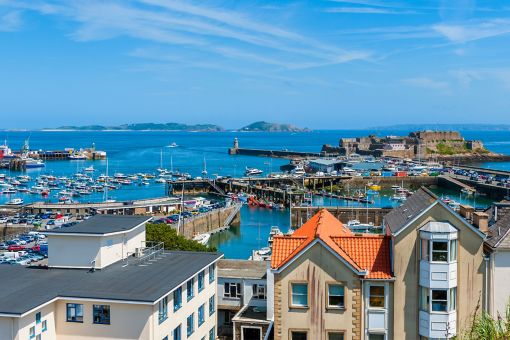Competitiveness between Guernsey and Jersey is rife in many areas. Whether in sport – such as the Siam Cup or Muratti Vase – or the performance of our financial centres, friendly competition and rivalry can often push people to achieve greater heights than they might otherwise have achieved.
One area where our two islands are not in competition, however, is tackling climate change.
This global crisis, which is set to define the political and economic landscape for decades – and our physical landscape for much longer – will impact Guernsey and Jersey regardless of our respective performance to combat it.
As the adage goes – “a rising tide raises all ships”. In this instance, a rising tide hurts both islands.
This is opportunity for our islands to collaborate. By sharing information on our successes, and – often more importantly – our missteps, our two islands can navigate the difficult and often uncertain pathway to net-zero.
Potential for collaboration
This was indeed the topic of the recent Chamber Lunch sponsored by KPMG, titled “Towards a Carbon Neutral Guernsey: Insights from Jersey’s Journey”.
At this event, Michelle Ryan, Chairperson at the Jersey Association of Sustainable Practitioners (JASP), shared with us some of the key learnings from Jersey’s Carbon Neutral Roadmap released in 2022.
These insights into Jersey’s successes and difficulties in implementing its roadmap should help Guernsey plot its own path to net-zero, whilst avoiding repeating any mistakes on its journey.
They also reveal how Guernsey’s pathway to net-zero mirrors that of its closest neighbour. The islands are of a comparable size, population, and economic makeup, with similar sources of carbon emissions. Collaboration to the benefit of both islands has rarely been such a straightforward argument.
Many local businesses operate across both islands and are thus subject to their respective rules and requirements. A more unified approach to tackling the climate crisis could reduce the legal and regulatory burden faced by local businesses, with decarbonisation requirements and climate positive regulation being consistently applied.
Opportunities in our finance industry
The finance industry offers many opportunities for collaboration between Guernsey and Jersey to further benefit and secure their respective economies. One example is through greater synchronisation on implementing sustainability-related reporting standards, such as those released by the International Sustainability Standards Board (ISSB).
We have seen many of our neighbours and closest business partners implement - or plan to implement – similar requirements. This includes the EU with its Corporate Sustainability Reporting Directive (CSRD) and the UK, which has announced its adoption of the ISSB standards expected in Q1 2025. By moving in sync on this, the risk each island faces is reduced.

This is similar to what we have seen with the implementation of recent global tax and transparency rules. Mandatory sustainability reporting could soon prerequire our islands to do business with other jurisdictions.
Any concerns regarding how these additional reporting requirements may make our islands less attractive don’t hold up to scrutiny. Many successful financial centres like Luxembourg or Dublin – with which we compete in the asset management space, for example - both have extensive mandatory sustainability reporting requirements driven by EU rules.
With better alignment on sustainability reporting between Jersey and Guernsey, an eye to regulatory interoperability with our key markets, businesses who fall in scope would need only contend with a single unified set of reporting requirements. This is opposed to potentially varying and complex reporting standards, which can be difficult to navigate.
Guernsey and Jersey could also collaborate on other key ingredients for a successful sustainable finance centre. Things like upskilling our workforce, conferences on sustainable finance, and alignment on guidance could all benefit from the increased economies of scale that a combined approach can bring.
Despite a well-publicised ESG “backlash” in some markets, Bloomberg reports predict ESG assets will make up over 25% of global assets under management[1]. This means there are more than sufficient opportunities in this space for both islands to expand and futureproof their respective economies, without risk of cannibalisation.
Guernsey and Jersey should capitalise on areas where they can work together to ensure they are seen as forward-thinking centres for sustainable finance. This should open each of them further to the opportunities that a global transition to net-zero may bring.
Where do we go from here?
Guernsey and Jersey should each take a more proactive approach in finding areas to collaborate on – to the benefit of local people and their impact on the wider world. Be it via our energy infrastructure and transition to renewables, the embedded emissions in transport to and from the islands or supporting the growth of our respective centres for sustainable finance.
The islands’ respective governments, businesses, and people need to come together to find areas of commonality and share knowledge and experience, so that we can all play our part in tackling the climate crisis.
There can still be place for friendly rivalry within this. The islands could compare the pace at which they are achieving net-zero targets and milestones, for example. But not at the expense of our ability to work together towards a greater goal.
How we can help
At KPMG, we have been working and collaborating across our islands for decades. We have a pan-island ESG team who assist clients in fulfilling their purpose and achieving their ESG goals.
We can work with you to enhance trust, mitigate risk, and help unlock new value as you build a resilient business for a more sustainable future. Find out more by contacting our ESG team, or visit kpmg.com/cds.
